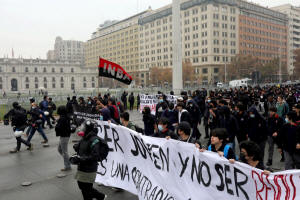High school on fire: violent protests by kids rock Chile
 Send a link to a friend
Send a link to a friend
 [July 05, 2022]
By Natalia A. Ramos Miranda [July 05, 2022]
By Natalia A. Ramos Miranda
SANTIAGO (Reuters) - As Chilean school kids
start winter vacation, they leave behind a semester marked by violence.
Several high schools around Santiago were taken over by students; one
was set on fire while hooded youths clashed with police and burned city
buses.
In June, the prestigious Internado Nacional Barros Arana (INBA) high
school in Santiago was temporarily shut over "severe" violence,
including the principal's office being set ablaze.
In a country that has seen rapid but uneven development in recent
decades, angry protests by students over expensive and poor-quality
school and university education have become more frequent.
For youngsters, that is now exacerbated, experts say, by
pandemic-related behavior issues. Although some signs of negative
long-term effects of coronavirus lockdowns on children have been seen
elsewhere, Chile seems to be particularly hard hit.
"We haven't seen anything elsewhere as drastic or dramatic as here,"
said Francisca Morales, UNICEF's Chile education officer.
The main impact had been on teens and preteens returning to school after
going through puberty in isolation, she said.
Chile's Education Superintendent reported a 56% jump in violent
incidents in the last semester compared to 2018 and 2019 before the
pandemic, a surge that has troubled politicians, psychologists and
teachers.

"After these two years they chafe more with authority and discipline.
There's a rejection of authority figures," said Esteban Abarca, a high
school teacher at the INBA school in Santiago.
"It's not comfortable for anyone to be in class when they're burning
things or attacking the principal."
[to top of second column]
|

Demonstrators take part in a protest called by students against the
Chilean government to demand increased scholarships, better
infrastructure in schools and changes to the public education system
in Santiago, Chile May 27, 2022. REUTERS/Pablo Sanhueza

Chilean students' history of protest goes back to
mobilizations against the dictatorship of Augusto Pinochet in the
1970s and 1980s. Students - including current President Gabriel
Boric - led demonstrations to demand education reforms in 2006 and
2011, and in 2019 more widespread protests saw months of rioting,
with metro stations and churches burned.
Florencia Acevedo, a 16-year-old high school student in Santiago,
said protests were the only way to be heard and while she did not
agree with bus burnings or clashes with the police, she sympathized
with the anger students felt.
"I understand those who do it because you act with rage sometimes,
shame and pain," she said, citing issues like schools missing basic
infrastructure, including doors and decent bathrooms.
"Adults don't take students seriously so we take over schools,
because if we try to talk they don't listen," Acevedo said. "We
regretfully live in a society that reacts to violence. If I give you
violence, you give me what I want."
Education Minister Antonio Avila told Reuters the issue was linked
to wider social unease.
Indigenous violence in the south has hit Boric's popularity, while a
new constitution that was meant to help iron out deep-seated issues
of inequality is at risk of failing to win enough support.
"The problems that occur in school communities are a reflection of
the problems we have as a society," Avila said.
(Reporting by Natalia Ramos, with additional reporting by Alexander
Villegas; Editing by Adam Jourdan and Rosalba O'Brien)
[© 2022 Thomson Reuters. All rights
reserved.]
This material may not be published,
broadcast, rewritten or redistributed.
Thompson Reuters is solely responsible for this content. |